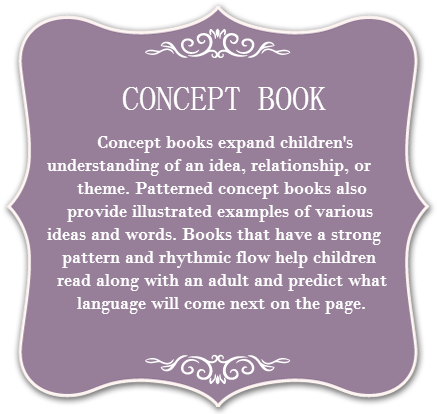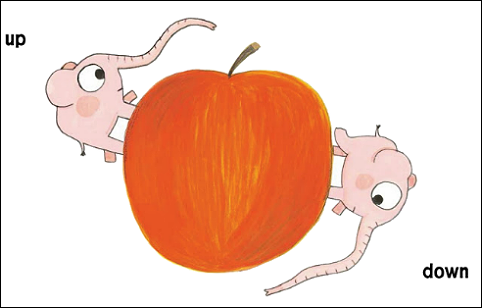July 30, 2013
Last month, I was at a workshop where I heard children's author David Martin talk about concept books. Since then, I've been inspired to look more closely at these books. If you're curious about concept books, or thinking about writing or illustrating one, this blog is for you.
Above is a general definition of 'concept book' from the University of California Cooperative Extension's website that I really like. To be more specific, you can recognize a concept book by these signs:
1) The book helps children learn age-appropriate concepts (like colors, patterns, shapes, counting, time, the alphabet, opposites, seasons, butterfly life-cycle etc.) and usually does so in a clever or creative way. Concept books are typically the first informational books a child will read. Some people include picturebooks that convey abstract concepts, such as change or fairness, in this category, but scholars like Ann D. Carlson (1991) limit the genre to books that teach tangible, concrete concepts.
Need an example? Emily Gravett's Orange Pear Apple Bear is a classic concept book that addresses the concepts of colors, shapes, and fruits:
2) The book may or may not have a plot. You will hear some people saying that concept books are nonfiction, purely informational books that do not have a plot, characters, or dialogue. This is actually a generalization and therefore false. It is true that many concept books don't have plots. These are your so-called "list books" books that read like a loosely structured catalog. Alphabears: An ABC Book by Kathleen Hague is a good example of a plot-less concept book. This book introduces a bear for each letter of the alphabet and describes its special qualities in rhyme.
Here are some of the pages from another plot-less concept book titled Pomelo’s Opposites. It was written by Ramona Badescu.
On the other hand, some concept books, like Mouse Paint by Ellen Stoll Walsh (spoiler alert), do have a plot; they tell a story that has a beginning, middle, and end, while conveying the concept or concepts (some concept books address more than one concept).
In Mouse Paint, three white mice hide from a cat by camouflaging themselves against a white sheet of paper. Then the mice discover three jars of paint: red, blue, and yellow. Each mouse climbs into a jar of paint and as they emerge, they leave puddles of paint on the paper. As they crawl through the puddles, they accidentally discover that they can mix colors to produce new ones and have fun mixing the colors. Finally, they wash themselves clean (in the cat's water bowl) and paint the paper with all the available colors―except for a section of white where they can hide from the cat. This concept book tells a story about three mice while addressing the concept of primary and secondary colors.
3) The book relies on pictures. Concept books are a type of picturebook because they use illustrations to convey the concepts and to tell the story if there is one. Concepts books are illustrated in a range of media, including photography.
Last words on concept books
• Because concept books are useful for introducing basic ideas, patterns, object sets and words, they are marketed for preschool and kindergarten audiences.
• Concept books are not only greatly enjoyed by children, they have often been favorites with award committees; concept books like Donald Crews' Freight Train and Lois Ehlert's Color Zoo have snagged Caldecott medals in recent years. So don't be fooled, concept books aren't easy to write; a lot of thought goes into them and if done well, you can come up with something distinctive with a lot of cleverness packed into it. Lois Ehlert is one author-illustrator who has made a career out of creating concept books.
So if you see a publisher stating "no concept books" in their submission guidelines, you know what they're talking about. Please don't hesitate to leave a comment if you have any questions or thoughts about concept books.
Also...
Check out these rather brilliant concept books!
• Press Here by Hervé Tullet
• Alphabet Under Construction by Denise Fleming







.png)







